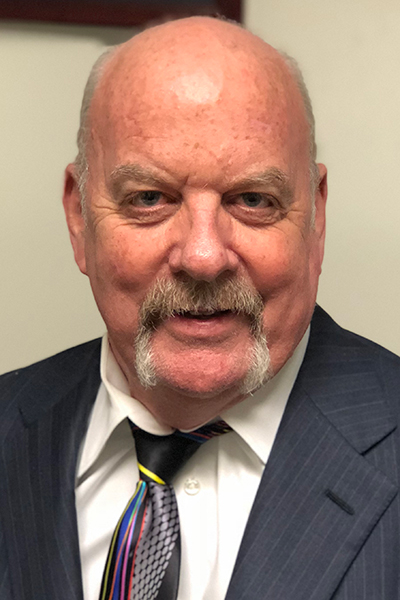
Joseph P. Lynch, III, MD, FCCP, will be recognized for his contribution to the development and training of chest physicians during his Edward C. Rosenow III, MD, Master FCCP/Master Teacher Honor Lecture on Monday, October 19, at 8:45 am CT.
“I’ve spent my career primarily as a clinician and as a teacher,” Dr. Lynch said. “Although I have published a modest amount, my work over the last 50 years has been focused on clinical care, medical education, and lecturing, and so I was very grateful to receive this award.”
Dr. Lynch, distinguished clinical professor of medicine and the Holt and Jo Hickman Endowed Chair in Advanced Lung Disease and Lung Transplantation, received his undergraduate degree from Harvard College and his medical degree from Harvard Medical School. He completed his internal medicine residency as well as his pulmonary and critical care medicine fellowship at the University of Michigan Medical Center, where he developed an extensive referral base for rare lung and autoimmune diseases. He remained on faculty there for 25 years before coming to UCLA in 2003. He was a CHEST Board Review Course lecturer for 18 years, lecturing on rare lung diseases.
Dr. Lynch will address what’s happened over the last 50 years in the treatment of vasculitis during his lecture titled “Evolving Therapies in ANCA-Associated Vasculitides.”
Antineutrophil cytoplasmic antibodies (ANCA)-associated vasculitides (AAV) include granulomatosis with polyangiitis (GPA), microscopic polyangiitis (MPA), and eosinophilic granulomatosis with polyangiitis (EGPA). AAV are exceptionally rare autoimmune disorders—incidence of three cases per 15 million for GPA, two cases per 9 million for MPA, and one case per 3 million for EGPA—that cause inflammation of blood vessels with a predilection for lung, renal, and multiorgan involvement.
In the absence of effective therapy, mortality rates were high, Dr. Lynch explained.
“Vasculitis is a very exuberant inflammatory response affecting blood vessels that causes significant injury, and may cause permanent damage, scarring, and even death,” Dr. Lynch said. “These three vasculitic disorders have another important feature in common—the presence of circulating ANCAs in blood and affected organs. This relationship, discovered in the 1980s, stimulated development of novel strategies to treat these diseases. Treatment in the 1950s and 1960s primarily employed corticosteroids (CS) alone, but mortality and morbidity remained high. In the early 1970s, a prospective study at the National Institutes of Health (NIH) in the US, directed by Anthony S. Fauci, MD, demonstrated substantial improvements in mortality and morbidity using cyclophosphamide (CYC), a cytotoxic immunosuppressive agent, plus CS as treatment for Wegener granulomatosis (now termed GPA). Over the next 4 decades, multiple randomized trials globally affirmed the benefit of CYC and CS over CS alone, but morbidity associated with CYC led to refinements in treatment. By the early 1990s, strategies to treat GPA and MPA still used CYC (combined with CS) as “induction therapy” (ie, for 3 to 6 months) until complete remissions (CR) were achieved. Following CR, less toxic agents (eg, methotrexate or azathioprine) were substituted for CYC to maintain remissions. This treatment remained the mainstay of therapy worldwide until July 2010 when two landmark randomized trials from the US and Europe reported high success rates with rituximab (RTX), a monoclonal antibody that depletes B cells (antibody-producing lymphocytes), as induction therapy for GPA and MPA. These studies showed that RTX was at least as effective, and possibly more effective than CYC for these disorders, and with less toxicities.
“So by getting rid of the B cells, which are the cells that make antibodies, you can actually resolve these conditions,” Dr. Lynch said. “That has been the most important change in therapy for AAV in the last decade.”
Given the rarity of AAV, research regarding treatment required meticulous multicenter trials not only in the US, but globally in multiple countries. Within the past decade, the importance of ANCA in the pathogenesis of these vasculitides led to the use of RTX to eliminate antibody production and inflammation, as well as new concepts of maintenance therapy using fewer and less toxic agents.
These important advances in therapy were made possible by a mass global effort.
“This talk is really a tribute to the ability of medical science to develop new strategies based upon multicenter studies,” Dr. Lynch said. “Knowing the science behind vasculitis has led to a strategy, which has been successful, and over time, development of large networks and hospitals that work together made the studies and discoveries possible.”
The studies are continuing, and over the past 2 to 4 years, have been focusing on additional dose ranges and different frequency of administration to maximize outcomes.
About Edward C. Rosenow III, MD, Master FCCP/Master Teacher Honor Lecture
This endowment recognizes Dr. Edward C. Rosenow, who has promoted the development and training of hundreds of chest physicians during his 3 decades at the Mayo Clinic. It acknowledges his role of mentoring pulmonary and critical care physicians into CHEST leadership roles, where he has fostered the development of physicians-in-training to improve patient care. The lecture is generously funded by the CHEST Foundation.
Are you registered for CHEST 2020?
Join your colleagues for four days of interactive, top-tier education on Sunday, October 18, to Wednesday, October 21, with dozens of live sessions and 50 credit hours of CME—all from the safety of your home. All CHEST Annual Meeting registrants will have access to the virtual platform until January 18, 2021.





